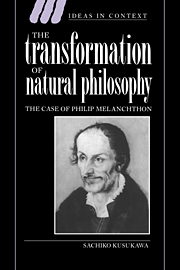Book contents
- Frontmatter
- Contents
- List of illustrations
- Notes on the text
- Acknowledgements
- Introduction
- 1 The way of the Schoolmen
- 2 Law and Gospel: the reforms of Luther and Melanchthon
- 3 The soul
- 4 The Providence of God
- 5 The construction of orthodoxy
- Conclusion: a transformation of natural philosophy
- Bibliography
- Index
- IDEAS IN CONTEXT
Introduction
Published online by Cambridge University Press: 06 November 2009
- Frontmatter
- Contents
- List of illustrations
- Notes on the text
- Acknowledgements
- Introduction
- 1 The way of the Schoolmen
- 2 Law and Gospel: the reforms of Luther and Melanchthon
- 3 The soul
- 4 The Providence of God
- 5 The construction of orthodoxy
- Conclusion: a transformation of natural philosophy
- Bibliography
- Index
- IDEAS IN CONTEXT
Summary
Of the countless ways in which historians may try to understand what sixteenth-century people made of the natural world, I offer in this book an account of what Philip Melanchthon, colleague and ally of Martin Luther, meant by natural philosophy. By the beginning of the sixteenth century, natural philosophy was a wellestablished subject in universities, a subject in which the nature of the natural world was discussed. In this study, I have looked at Melanchthon's idea of this natural philosophy in a way which is different from traditional accounts found in the histories of science, of renaissance philosophy or of universities. A different approach has meant a different picture. On my reading, natural philosophy emerges as undergoing a significant transformation at the hands of Melanchthon. In the following pages, I have tried to chart this transformation which, to my knowledge, has never been fully appreciated.
Today Melanchthon is best remembered for his attempts to explain Luther's theology of ‘justification by faith alone’ in his Loci communes and for his influential educational reforms which earned him the title of the Praeceptor Germaniae. Amongst the innumerable products of his prodigious writing and editing activity, there were two textbooks on natural philosophy, the Commentarius de anima and the Initia doctrinae physicae. These and their revised editions were read widely across Northern Europe throughout the sixteenth century.
Historical assessments of the significance of Melanchthon's natural philosophy have, however, remained oddly fragmented. For instance, historians have congratulated Melanchthon on the swift incorporation into his textbooks of some of the new findings of Copernicus and of Vesalius; on his enthusiastic promotion of mathematics; and on his success in educating a series of students of astronomy and botany.
- Type
- Chapter
- Information
- The Transformation of Natural PhilosophyThe Case of Philip Melanchthon, pp. 1 - 6Publisher: Cambridge University PressPrint publication year: 1995



